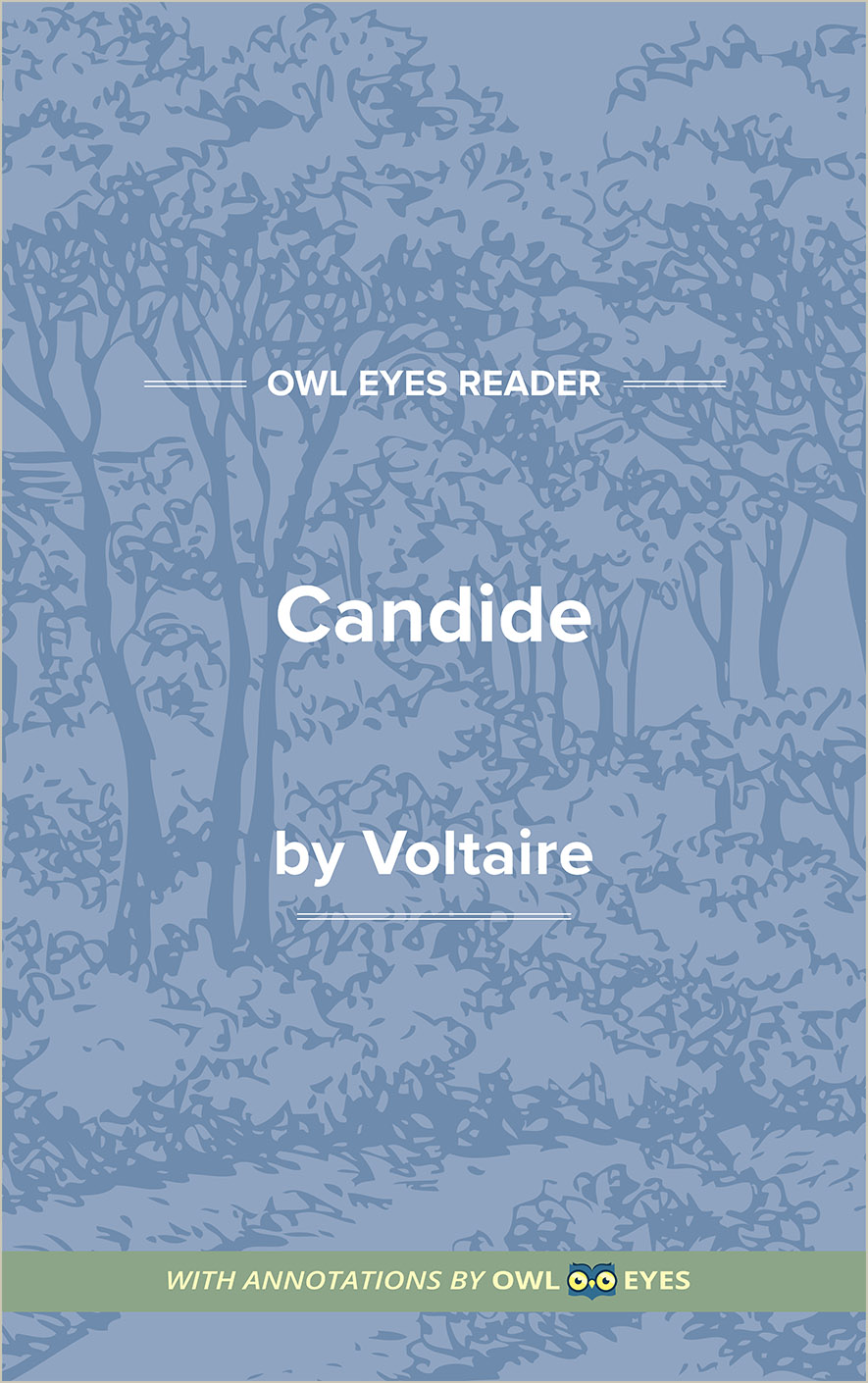Analysis Pages
Themes in Candide
Optimism vs. Reality: Voltaire’s Candide has many themes, but its most central is the inadequacy of optimistic thinking. Certain philosophers from Voltaire’s time actively preached that the world was in its best possible state, created in perfect balance and order. Voltaire was unable to reconcile this idea with his own life in which he saw immeasurable and senseless suffering. In Candide, Voltaire demonstrates how Pangloss’s optimism fails to account for random, chaotic events and the needless suffering of others.
Thinking vs. Action: Voltaire’s biting critique of optimism goes hand in hand with another central theme; the failings of philosophical thinking. Pangloss once again serves as the central character for Voltaire’s critique. Pangloss’s philosophical musings seem farcical in the face of reality. For example, in the aftermath of the Lisbon earthquake, Pangloss chooses to contemplate the earthquake’s causes rather than doing anything to help, leaving Candide crushed under the rubble. Candide demonstrates how speculating on life can cause one to sit idly by rather than helping others. As such, philosophical or speculative thinking is portrayed as both useless and potentially destructive.
Social Criticism: Voltaire uses Candide to expose the failings of his society. Candide serves as a sharp critique of political and religious oppression, sexual violence against women, and the corruptive power of money.
Themes Examples in Candide:
Chapter I
🔒"thus we have spectacles..." See in text (Chapter I)
"necessarily for the best end..." See in text (Chapter I)
Chapter III
🔒"do you believe the Pope to be Anti-Christ..." See in text (Chapter III)
"and the Abarian heroes had treated it in the same way..." See in text (Chapter III)
"causing Te Deum to be sung each in his own camp..." See in text (Chapter III)
Chapter IV
🔒"for private misfortunes make the general good..." See in text (Chapter IV)
"mankind have a little corrupted nature..." See in text (Chapter IV)
"He wrote well, and knew arithmetic perfectly..." See in text (Chapter IV)
"no letting of blood or taking a glister..." See in text (Chapter IV)
"p—x—d..." See in text (Chapter IV)
"know nothing of it..." See in text (Chapter IV)
"evidently opposed to the great end of nature..." See in text (Chapter IV)
Chapter V
🔒"you do not then believe in liberty..." See in text (Chapter V)
"This is the Last Day..." See in text (Chapter V)
Chapter VI
🔒"for rejecting the bacon which larded a chicken..." See in text (Chapter VI)
Chapter VIII
🔒"the grand Miserere to which they whipped you..." See in text (Chapter VIII)
"why I am still beloved..." See in text (Chapter VIII)
Chapter X
🔒"and that each has an equal right to them..." See in text (Chapter X)
Chapter XI
🔒"Mount Atlas..." See in text (Chapter XI)
"the five prayers a day ordained by Mahomet..." See in text (Chapter XI)
"so common in Africa..." See in text (Chapter XI)
"Pope Urban X..." See in text (Chapter XI)
Chapter XII
🔒"a German professor named Robek..." See in text (Chapter XII)
"they resolved also to devour the women..." See in text (Chapter XII)
Chapter XIV
🔒"the happiest of mortals..." See in text (Chapter XIV)
"and in Europe confess those kings..." See in text (Chapter XIV)
Chapter XVI
🔒"when they knew I was not a Jesuit..." See in text (Chapter XVI)
"to kill our neighbor..." See in text (Chapter XVI)
"they are a fourth part human, as I am a fourth part Spaniard..." See in text (Chapter XVI)
"he went on eating..." See in text (Chapter XVI)
Chapter XVII
🔒"let us recommend ourselves to Providence..." See in text (Chapter XVII)
Chapter XIX
🔒"a Socinian..." See in text (Chapter XIX)
Chapter XX
🔒"but why should the passengers be doomed also to destruction..." See in text (Chapter XX)
"as well as in everybody else..." See in text (Chapter XX)
"Surely you must be possessed by the devil..." See in text (Chapter XX)
"Manichean..." See in text (Chapter XX)
Chapter XXI
🔒"that the earth was originally a sea..." See in text (Chapter XXI)
Chapter XXII
🔒"men..." See in text (Chapter XXII)
"Jansenist against Molinist..." See in text (Chapter XXII)
"yet the scene is in Arabia..." See in text (Chapter XXII)
Chapter XXIV
🔒"with these piastres only render them the more unhappy..." See in text (Chapter XXIV)
"which appears so pleasant to you men..." See in text (Chapter XXIV)
Chapter XXV
🔒"Seneca..." See in text (Chapter XXV)
"Ariosto..." See in text (Chapter XXV)
"when I think I see nature itself..." See in text (Chapter XXV)
Chapter XXVI
🔒"But Candide paid no regard to these newcomers..." See in text (Chapter XXVI)
Chapter XXVII
🔒"to whom he sold for fifty thousand sequins a diamond worth a hundred thousand..." See in text (Chapter XXVII)
Chapter XXX
🔒"whether the mice on board are at their ease or not..." See in text (Chapter XXX)

